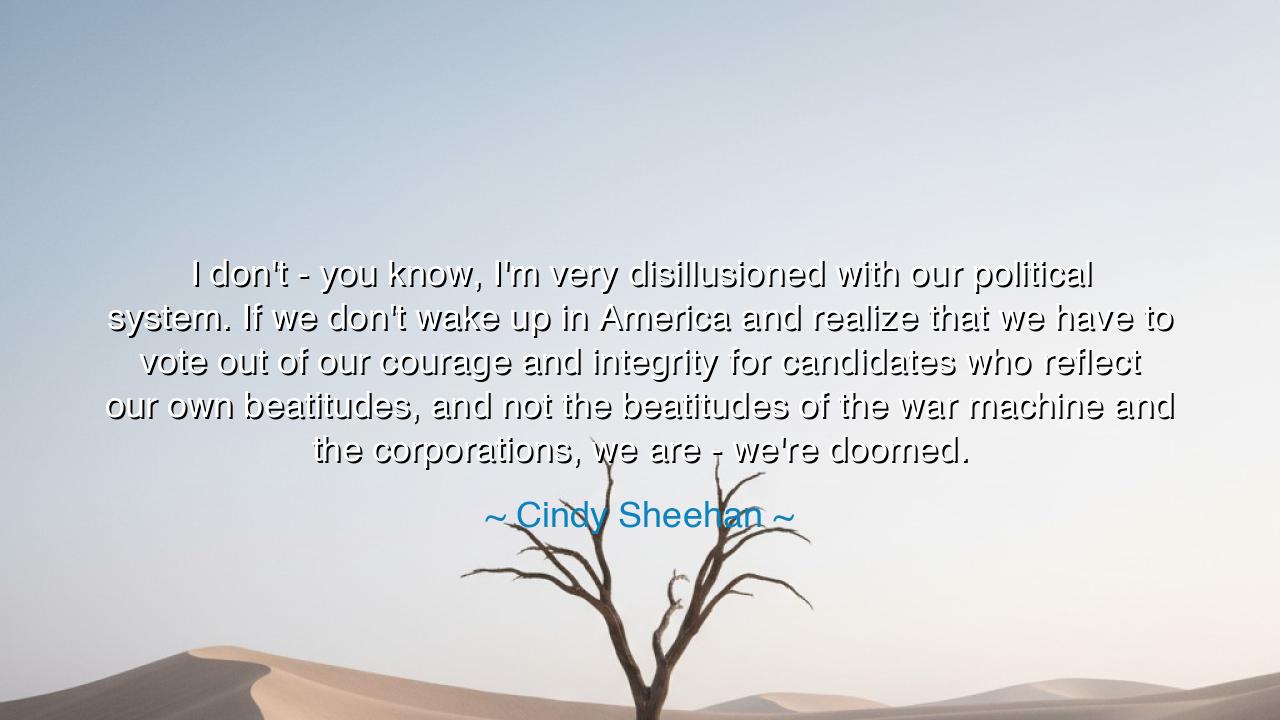
I don't - you know, I'm very disillusioned with our political
I don't - you know, I'm very disillusioned with our political system. If we don't wake up in America and realize that we have to vote out of our courage and integrity for candidates who reflect our own beatitudes, and not the beatitudes of the war machine and the corporations, we are - we're doomed.






The activist Cindy Sheehan, whose grief was transformed into courage and whose voice rose from the depths of loss, once spoke these piercing words: “I don't - you know, I'm very disillusioned with our political system. If we don't wake up in America and realize that we have to vote out of our courage and integrity for candidates who reflect our own beatitudes, and not the beatitudes of the war machine and the corporations, we are - we're doomed.” In this lament, Sheehan does not speak merely as a critic of politics, but as a prophet of conscience. Her words burn with moral urgency, calling a nation to awaken from its slumber of apathy and to remember the sacred duty of citizenship. She warns that when courage and integrity are abandoned at the ballot box, the soul of democracy itself begins to die.
The origin of these words lies in Sheehan’s own journey through unspeakable loss and righteous rebellion. Her son, Casey Sheehan, was killed in the Iraq War in 2004—a war she came to see as born of deception and driven by greed. From the ashes of that personal tragedy, she rose not as a figure of hatred, but as a voice for peace, confronting presidents and generals with the fierce love of a mother who had given everything. Her disillusionment with the political system was not born of cynicism, but of sorrow for a nation that had strayed from its moral compass. When she speaks of beatitudes, she invokes not politics but the language of the sacred—the blessings of mercy, humility, and justice that Christ spoke on the mount. Her plea is not for victory, but for redemption.
To “vote out of courage and integrity,” as Sheehan implores, is to act not out of fear or convenience, but from the higher law written upon the heart. It is to see politics not as a marketplace of promises, but as a reflection of our collective soul. She warns that too often nations choose their leaders not for their virtue, but for their power; not for their compassion, but for their might. The war machine, she says, feeds upon this weakness—upon fear, profit, and the pride of empire. And when the corporations rule over the people, when profit speaks louder than principle, democracy decays into tyranny disguised as order. Her words are both an accusation and an invitation: to choose light over comfort, conscience over conformity.
History has shown again and again the cost of failing to heed such warnings. In ancient Rome, the Republic fell not through invasion, but through corruption—the gradual surrender of virtue to wealth and ambition. The people, weary and divided, traded their voice for bread and spectacle, until they awoke under the rule of emperors. So too in modern times have nations fallen when citizens, disillusioned or afraid, ceased to vote with their integrity. When the people forget their moral responsibility, they become subjects rather than citizens. It is not the tyrant who first kills democracy—it is the apathy of those who no longer believe they have the power to change it.
But Sheehan’s words are not merely a warning—they are a call to rebirth. Her voice, like that of the ancient prophets, cries out for renewal through courage. To vote with courage is to act even when the world mocks or despairs. It is to believe that every moral choice, however small, ripples through the fabric of history. To vote with integrity is to refuse the seduction of ease—to stand with the weak, to protect the innocent, to challenge the strong. For democracy is not sustained by institutions alone; it is sustained by the daily act of conscience. When the people choose truth over illusion, the nation is healed.
In her invocation of beatitudes, Sheehan reminds us that politics must serve the spirit, not the sword. The true measure of leadership is not power but compassion, not wealth but wisdom, not conquest but peace. The beatitudes of the war machine—greed, domination, and vengeance—lead only to ruin. But the beatitudes of the heart—mercy, righteousness, and humility—build nations that endure. Sheehan’s vision is of a people who no longer serve the idols of profit and power, but who live by the sacred law of justice and love.
So, my child, take these words as a mirror for your own age. Do not turn away in despair from the political system, for even in its corruption lies the chance for redemption. Rise each time you are tempted to believe your voice does not matter. Speak, act, and vote as one who carries the torch of courage and integrity, for silence is the ally of decay. Measure every leader, every policy, by this question: does it uplift the human spirit, or does it crush it? Stand always with the former, even when it costs you comfort or acclaim.
Thus, the wisdom of Cindy Sheehan endures: that democracy is not a machine to be served, but a covenant to be honored. And if the people choose their beatitudes well—if they choose peace over profit, truth over fear—the flame of liberty will burn bright once more. But if they surrender that sacred duty, if they yield their conscience to the war machine, then indeed, as she warns, they are doomed. For nations perish not when their armies are defeated, but when their souls grow indifferent to the light of righteousness.






AAdministratorAdministrator
Welcome, honored guests. Please leave a comment, we will respond soon